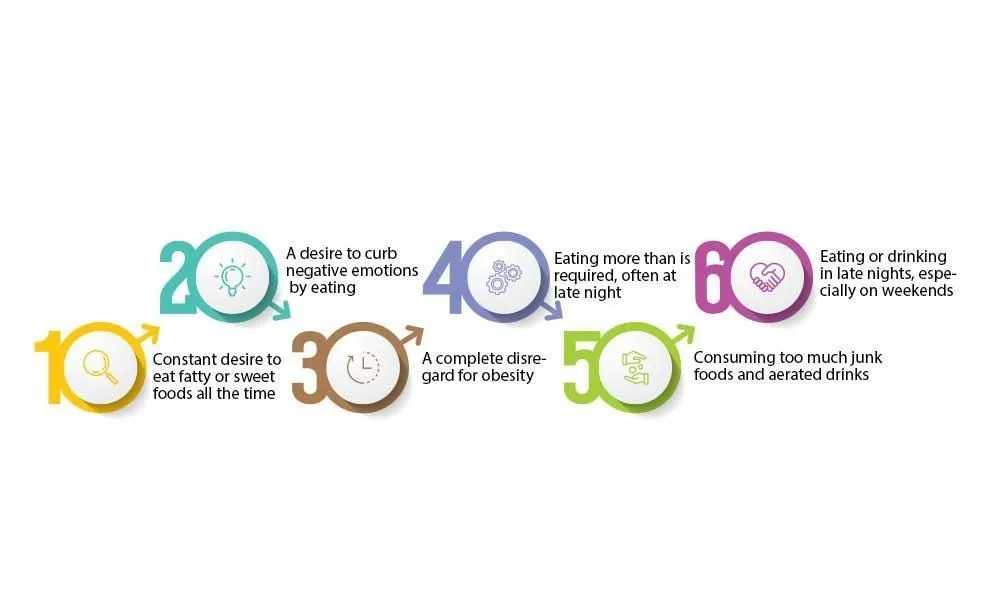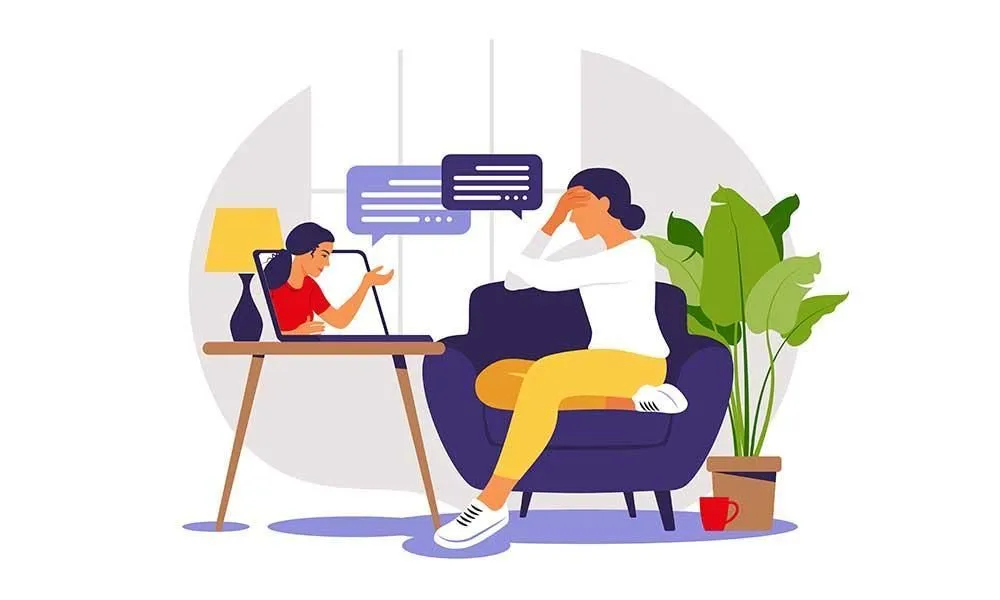In our busy and overscheduled lives, stress regularly affects our mood, positivity, and our physical and mental identities. Some of its most common triggers are finances, work, and relationships that may together work in unison to blur our focus. Here’s how to ride that overwhelming challenge with ease.
When we are under stress, depression, or mental ailments, we often eat compulsively to control our emotions. This causes our health to degrade and makes us fatter, flabbier, and out of shape. We may also accrue unwanted fat on our midsection (usually belly) and it travels down to our thighs and butts. The more and longer we stay in such a traumatic environment, the worse it fares for us.
It also affects us subtly. Stress and depression may also wreak destruction on a person's self-belief to leave him reeling with a morbid distaste in life. This further prevents him from keeping those extra pounds off and living a healthier life. As one tends to indulge in unhealthy habits and eat and drink merry, staying fit takes a backstage and shaky confidence only makes one’s eating habits worse.
Anxiety and tension trigger the adrenal response inside us, a natural process called the fight or flight response. When we turn to food as a compulsion, it stacks up more cells of unused energy. Since that bag of excess calories is never used up, its deposition on our body leads us to faster weight gain and heart ailments. This episode is called Emotional Eating.
One study conducted by the University of New Mexico in 2005 showed that this stress response leads to increased fat storage, loss of muscle mass, and an individual’s impulse to eat more than he or she should in normal circumstances.
Made in adrenal glands, cortisol is a steroid hormone that inhibits weight loss. Prolonged exposure to testing situations stimulates the body to release more cortisol in the bloodstream to slow down the metabolism and thus cause a loss of muscle mass. That’s why our diet is directly affected by a rise in hormones- and we overeat things to make ourselves feel that we are “ready for it.”
Did you know? This also turns into a cyclic effect- we get stressed and we eat more, and vice versa.
It also causes the unwanted storage of fat, especially in the abdominal region. A report published by the National Endocrine and Metabolic Diseases Information Service states that other possible signs of high cortisol levels are fatigue, high blood pressure, and high blood glucose levels. Prolonged exposure to a tense and depressing situation may even lead to long-term physical and mental issues.
Caution: Our Wellness Experts warn against a serious condition called Cushing's syndrome. Caused by an excess secretion of this stress hormone, it results in a tumor that produces another lethal hormone called adrenocorticotropic.
An article published in the British Medical Journal in 2006 showed that employees with chronic work anxiety are twice more likely at risk of metabolic syndrome than those who don’t have such issues. It may also increase a person’s risk of Type-2 Diabetes and heart stroke.
With a rise in mental tension and disorders, one may experience a surge in the sugar (or glucose) levels in one’s bloodstream and brain. This can impair or limit the body’s natural ability to repair tissues. This is why most accidents happen when one is not driving in one’s right mind.
Emotional eating is a common problem among most young children, teenagers, and adults. Nerve-wracking situations often trigger the simultaneous release of cortisol and adrenaline. As they reach a level higher than a certain threshold, they increase our appetite and lead us to excessive sugar cravings.
This is all the worse for diabetic patients who are instructed to eat and drink in controlled amounts. Feeling tense and anxious only disturbs their eating habits for the worse, and makes them overeat and go for the sweeter foods. This spirals back into more health issues.
Tip: Our healthcare experts recommend all diabetics keep a few candies with themselves when they go somewhere. It is also advisable to keep a visiting card that reads their name, address, emergency contact number, blood group, allergies (if any), and a list of medications that they are taking.
It is not possible to isolate the after-effects of living or working in highly stressful conditions because they alter the person’s thought process. Such traumatic experiences may often lead someone to behavioral extremes like Obsessive-Compulsive Disorder or PTSD.
A mix of these could lead a person to eat compulsively every now and then, a disease known as Stress Eating Disorder with the following symptoms:
1. Constant desire to eat fatty or sweet foods all the time
2. A desire to curb negative emotions by eating
3. A complete disregard for obesity
4. Eating more than is required, often at late night
5. Consuming too much junk foods and aerated drinks
6. Eating or drinking in late nights, especially on weekends
This disease is also called Binge Eating Disorder. It becomes worse with the realization of guilt that a person gets when he is done eating his favorite stuff, especially when he is obese or is overweight. It also turns into a cyclic process with the person eating up even more to cover the guilt.
How to prevent Stress or Emotional Eating?
Beating stress can seem like an impossible task but you can do it by practicing a few calming techniques every day. First, identify what’s causing stress in your life and write it down somewhere. Next, take a few minutes of your day to meditate and breathe deeply, preferably before you start your day or work.
Persisting with Yoga and Zen under expert guidance would help you beat the tension for good. It would also make you good at something else, a fact that you can always look back on to boosting your self-esteem. If you feel like giving up, you can eat chocolates to help yourself on a rough day!
People turn towards food to beat anxiety. Food triggers the reward centers in the brain and the most effective ones are those that are sweet, fatty, and salty. Unfortunately, these foods may also take a toll on your digestion, metabolism, mood, and even wellbeing.
Here are some foods that you should eat less if you are facing anxiety and depression:
Sugar could be your worst enemy unless it’s taken in a controlled manner, like a small piece of chocolate once in a while. Sugary foods hold little to no nutritional value but can cause blood sugar and insulin levels to fluctuate, often to dangerous limits.
These health conditions may lead to poor concentration, bad mood, and irritability. If you’ve eaten a bit too much during the holidays, chances are you’ve experienced some mood swings along the way as well.
2. High sodium
We need sodium but in moderate amounts. Sodium is a water magnet and if you take too much of it, you could end up with a serious medical condition called water retention. This pressurizes your heart to work harder to pump the same amount of blood through your body, thus increasing your BP. High sodium foods may also cause bloating and puffiness that can be quite unpleasant.
If you’re turning towards energy drinks for a quick pick-me-up, you might as well stick to a cup of coffee instead. Energy drinks and other highly caffeinated beverages feed stress and make it a bigger mess. The combination of caffeine and sugar makes you jittery, taxing the body, and adding more stress. Energy drinks also affect your sleep adversely and may irritate you later.
Processed or junk foods are loaded with sodium, fat, artificial additives, and sugar. We typically turn towards these delicious edibles when we are hungry or bored, but they may also aggravate stress levels. They contain very little nutrients, lots of calories, and they directly increase cortisol (the stress hormone) levels.
Artificially sweetened candies are just as bad as sugar-sweetened ones. They can cause digestive problems and exacerbate acidity and anxiety. This can lead to grumpiness, bloating, and general discomfort with your body.
As you start feeling worse, you go to eat sweeter foods and cola drinks yet again, this circles back to cause you more discomfort.
Who doesn’t love spicy food? If you’re experiencing digestive problems and higher anxiety levels, then you should stay away from spicy foods. People who are easily startled often have a weaker digestive system that cannot process food effectively and quickly.
This stunts their metabolic process and makes it more difficult for their body to digest food. This also causes food to remain in the stomach for longer, leading to acid reflux and a buildup of toxins.
If you think eating your way to glory is the only remedy for your stress, you couldn’t be more wrong. The good thing is that you can start curing yourself at home.
We recommend eating natural depressants like oysters, mussels, leafy greens, lettuce, peppers, seafood, and lean organ meats. Drinking more water would help you get the most of your next green diet (consisting of broccoli, cauliflower, cabbage, kale, and Brussels sprouts). It is just as important to stay away from sugary, carbonated, and fatty foods or drinks.
It must be noted that the levels of stress that you are facing and the diet you are taking are both interrelated. People with a weaker self-image are prone to be under anxiety and stress more than others, and a longer exposure could even turn into a chronic health issue.
There is no substitute for consulting a virtual mental therapist in the earlier stages to find a better way to deal with those traumatic issues. The more clearly you can communicate your issue to him, the better recourse he may provide you to get over it.
At times, just speaking your heart out with an expert would make you lighter in your mind. Remember, life is too short to be unhappy!



